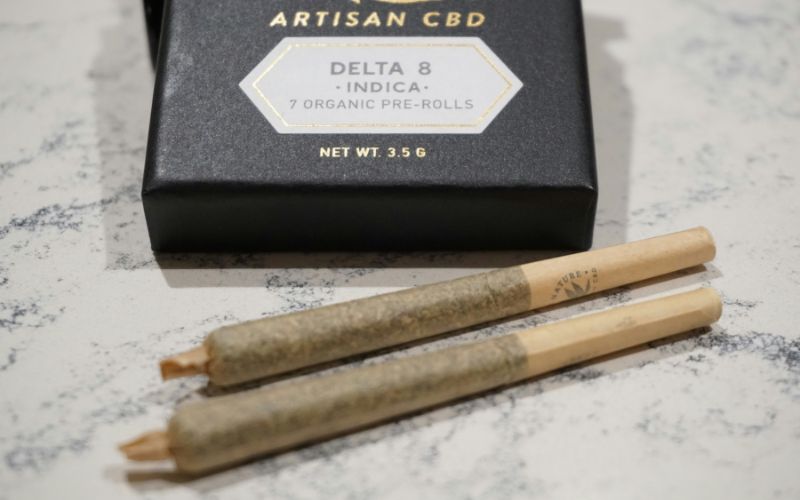“There is a serious lack of education in public officials as to what they are trying to regulate and (they) don’t want to take the time to really learn about it,” says Craig Katz, Government Relations and Compliance Manager of CBD Kratom, the largest privately held cannabis retailer in North America. Katz was referring to governmental attempts to outlaw delta-8 products, which would affect “most family farms.”
Delta-8 THC, a natural cannabinoid found in marijuana plants, was discovered in the 1940s. It appears in small amounts, and scientists have since learned how to extract and isolate the cannabinoid for use in other products.
Although delta-8 has existed over 80 years, it has experienced a huge uptick in popularity since hemp became legal in The 2018 Farm Bill. That legislation defined legal hemp as containing less than 0.3% THC. Hemp or any other plant containing more than 0.3% THC is considered to be marijuana.
Meanwhile, countless delta-8 manufacturers and retailers have proliferated since 2018. The demand is clear: sales for hemp-derived cannabinoids in the U.S. alone grew from just over $200 million in 2020 to nearly $3 billion in 2023. According to Katz, worldwide demand is more than nine times that, at $28 billion annually.
Katz is dismayed that the 2024 Farm Bill is “languishing in the House and Senate due to the malaise in Congress.” The legislation contains The Mary Miller Amendment, which bans almost 95% of all ingestible hemp products currently on the market. On July 11, 2024, The House Appropriations Committee approved the amended bill. As of this publishing deadline in mid-August 2024, the legislation continues to sit on the House floor.
Federal and State Agencies Express Concerns About Delta-8
This past summer, the Federal Trade Commission and the Federal Drug Administration sent a second set of Cease-and-Desist letters to companies selling delta-8 products in bright, colorful packaging like children’s candy.
In a July 16, 2024 press release, Samuel Levine, the director of the FTC’s Bureau of Consumer Protection said, “Companies that market and sell edible THC products that are easily mistaken for snacks and candy are not only acting illegally, but they are also putting the health of young children at risk.” Levine also warned businesses that “prioritize profits in front of children’s safety are at serious risk of legal action.”
State governors and state attorneys general have also begun railing against delta-8. In Missouri, for example, Governor Mike Parson issued an executive order banning the sale of delta-8 and other psychoactive hemp derivatives. It was set to become effective September 1.
“He literally can’t do that. Now it’s a legal battle,” says Katz, who notes that 44 states and the U.S. Terrorities either specifically permit delta-8 or have no regulations. Only six have specifically banned delta-8 products.
Katz argues the hemp industry is actually in favor of regulations. But, he adds, they have to be “fair.”
CBD Kratom “self-regulates,” he says. For example, no one under 21 may enter their retail outlets and their products’ packaging is labeled clearly not to appeal to children.
Meanwhile, Ohio’s Republican governor has been urging lawmakers in his state to ban delta-8 THC for several months. In late July, a Republican state representative introduced a bill to do just that. Ohio’s lack of regulations on delta-8 means anyone, including minors, can easily purchase it anywhere, including gas stations.
The state of New York, which legalized marijuana in 2021, banned the sale of synthetic cannabinoids like delta-8 in November 2022. According to Geneva City Court Judge Elisabeth Toole, in her 27 years on the bench, she has never presided over a delta-8 case. “Now, with a law banning it in New York, judges have clear directives as to how to deal with those cases if they arise,” she says.
At least one major player in the hemp market has decided manufacturing delta-8 products is not worth the investment.
According to Kim Sanchez Rael, CEO and co-founder of Azuca, which was just named to the 2024 Inc. 5000 annual list of the fastest-growing companies in America for two years running, her company has “intentionally chosen to avoid delta-8 products. The broad interpretation of a loophole in the Farm Bill has led to a flood of unregulated hemp-derived intoxicating cannabinoids, including delta-8, creating significant safety risks, particularly for teenagers who may unknowingly consume these products without any established safety standards.”
Becky Osborn, of Columbus, Ohio, is one delta-8 devotee who hopes it is here to stay.
“I seriously hope they don’t ban it. I’m a retired woman with a crap ton of medical conditions. Since doctors today will not give you crap for pain, I depend on my gummies to help me sleep, relieve back pain from arthritis, and relieve my migraines. If they ban the sale of these products, I’m gonna freak out!” says Osborn.
This article appears in edition 6.2 of Cannabis & Tech Today magazine, a special edition featuring the women in the cannabis industry.
Photo by Elsa Olofsson on Unsplash







